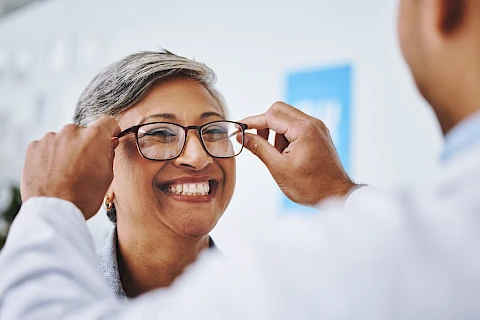
Eye health is a pivotal aspect of senior well-being that's often overlooked. As National Eye Exam Month approaches, it's a good time to focus on aging and your eyes and the steps you can take to maintain healthy vision. Caregivers and seniors should learn valuable information about common eye problems, the importance of regular check-ups, and ways to adapt daily life for better eye care.
Common Age-Related Eye Conditions
Many older adults face eye conditions that, if not properly managed, can impact their daily lives. Cataracts, glaucoma, and macular degeneration are some of the most common issues.
Cataracts cause cloudy vision, making tasks like reading difficult. Glaucoma can sneak in unnoticed, gradually causing loss of vision. Macular degeneration affects central vision, which is necessary for detailed activities such as recognizing faces or driving.
Early symptoms could be blurred vision, difficulty distinguishing colors, and trouble adjusting to different lighting. If not addressed, these conditions can severely affect a senior's independence.
Importance of Regular Eye Check-Ups
Regular eye exams every one to two years help identify age-related changes like cataracts, glaucoma, and macular degeneration before they affect daily life. Early detection allows for timely management that can preserve vision. Signs such as difficulty reading, frequent headaches, or sudden vision changes should prompt a visit to an eye care professional. Adjusting home lighting, reducing glare, and using high-contrast items can make everyday tasks easier and safer. Updating prescription lenses and wearing appropriate eyewear also supports clearer vision and comfort.
Recognizing Signs of Vision Problems
Vision changes often bring about noticeable behavioral shifts. If your loved one seems more hesitant to participate in activities or frequently bumps into objects, these might be red flags. Physical signs like squinting, complaining about glare, or persistent eye discomfort are also indicators. Seek professional help when these signs are evident to prevent further deterioration.
Adapting the Home Environment
Creating a comfortable living environment is advantageous for those experiencing vision changes. Begin by improving the lighting in the house. Ensure all spaces are well-lit, and reduce glare by using diffused lighting. Declutter and organize furniture to make pathways clear.
Incorporating contrast in home decor can also aid visibility—think white mugs on dark tables. Consider adding assistive devices like magnifying glasses or screen readers to help seniors adapt to their changing vision.
Adjusting Daily Routines
Daily habits significantly impact eye health. Encourage activities that are easy on the eyes, such as audiobooks or large-print reading materials. Regular breaks during tasks like watching TV or using the computer can also reduce eye strain.
Supporting independence is recommended, but safety should always come first. Encourage seniors to take their time with tasks, and reassure them it's okay to ask for help when needed. By adapting routines, seniors can continue enjoying daily activities while caring for their eyes.
Personalized Assistance for Seniors with Changing Vision
Taking a proactive approach to eye care helps maintain quality of life as we age. Regular eye exams and healthy habits can help seniors preserve their vision and independence.
It's never too late to schedule an eye exam. Make it a priority this National Eye Exam Month.
For seniors experiencing vision changes, having compassionate support can make a meaningful difference in daily life. Senior Helpers Huntingdon Valley offers personalized care to help manage eye health needs safely and comfortably. Serving Hatboro, Bryn Athyn, Willow Grove, Jenkintown, and Jamison, we assist with medication reminders, navigating the home, and adapting routines to accommodate vision changes. Reach out to learn how our team can help your loved ones maintain independence and confidence while protecting their eyesight.